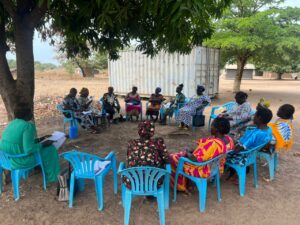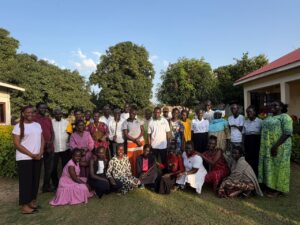
South Sudan’s women leaders, government officials, development partners, civil society organizations, and persons with disabilities convened in Juba for the Fifth Annual National Conference on Women, Peace and Security (WPS), held under the theme “Restoring Hope and Commitment for Action: Advancing Women’s Role in Peacebuilding.”
Organized by EVE Organization for Women Development in partnership with the Ministry of Gender, Child and Social Welfare, UN Women, Cordaid, Plan International, SaferWorld, and other partners, the two-day conference marked a significant milestone: the 25th anniversary of UN Security Council Resolution 1325 and the final WPS conference under the current project cycle.
The gathering brought together 300 participants from across the country, including women-led organizations, government institutions, political parties, security forces, academia, youth, traditional leaders, and international partners to reflect on progress, assess persistent barriers, and chart a unified path for women’s participation in peacebuilding.
A Fragile Moment for Peace and a Call for Action
In her opening remarks, Hon. Gloria Nyoka, Co-founder of EVE Organization, noted that the conference comes at a time when South Sudan’s peace process faces “severe setbacks,” including a deteriorating permanent ceasefire, a deep political impasse, and escalating humanitarian needs.
She emphasized that South Sudanese women continue to face recurring conflict, displacement, climate shocks, and shrinking civic space, yet they remain essential actors in building peace.
Reflecting on the significance of the annual WPS conference, she said it has become a national platform where women from diverse backgrounds share experiences, strengthen partnerships, and elevate their voices. She urged unity among women.
“We remind ourselves that women have a vital role to play in building peace. We call on all women to stand united for peace no more war.”
Women as Architects of Peace
Mr. Paul Lusato, Country Director of Plan International South Sudan, reaffirmed the organization’s commitment to feminist leadership and dismantling barriers that limit women’s agency.
“Peace is never sustainable without the full and meaningful participation of women. Women are not just beneficiaries of peace, they are actors and architects of peace.”
He highlighted the Leaders of Peace project, implemented with partners including EVE, AMA, PAX, and HealthNet TPO, which has empowered hundreds of young people as champions of peace.
Lusato called on stakeholders to move beyond dialogue and toward coordinated action that amplifies women’s voices and leadership.
Peace Begins at Home and in Communities
Tom Otieno, Country Director for Cordaid South Sudan, reminded participants that peace is a collective responsibility:
“Peace begins in our homes, our families, and our villages long before it reaches the national level.”
He applauded EVE Organization’s landmark advocacy that led to the inclusion of the 35% women’s quota in the 2018 revitalized peace agreement. He emphasized unity and diversity as strengths:
“Our diversity is not a weakness; it is our strength. When we stand together, no one can divide us.”
Women Hold Communities Together Amid Conflict
Speaking for Saferworld, Doruba Judith, Program Manager, highlighted the daily realities of women in conflict-affected areas:
“In deep rural communities, peace begins at sunrise. Women walk long distances praying that no gunshots will be heard today. Their resilience holds communities together.”
She emphasized that women are not only victims of conflict but architects of peace, mediating tensions, rebuilding communities, and sustaining families. She urged donors and government partners to move from dialogue to action and ensure women are equal partners in decision-making spaces.
A representative from UN Women, Miriam Suleiman, reflected on 25 years of the WPS agenda, stressing that peace agreements that include women are 35% more likely to last.
“Women lead more than half of community dialogues in South Sudan, often without recognition. If we are serious about peace, every policy and partnership must begin with the recognition that women are the foundation of peace.”
She called for stronger coalitions linking grassroots and national efforts and for conference outcomes to translate into real programs, budgets, and results.
International and Government Support
His Excellency Paul Tholen, Ambassador of the Kingdom of the Netherlands, reaffirmed his country’s long-standing partnership in advancing gender equality and women’s rights in South Sudan:
“Equal rights for women and men require constant work and commitment. Globally, the fight for women’s rights is sliding backward. The role of South Sudanese women is more crucial than ever.”
He urged all stakeholders to strengthen women’s capacity to champion their rights.
Senior government officials, including Regina OSA Lulo and Undersecretary Esther Ikere from the Ministry of Gender, Child and Social Welfare, outlined the four pillars of the WPS agenda. participation, protection, prevention, and relief & recovery and emphasized the need for consistent implementation, strong coordination structures, and high-level political backing for the second National Action Plan (NAP).
As South Sudan navigates a fragile political transition, speakers during the conference shared a unified message: women must remain at the center of peacebuilding. Their leadership, resilience, lived experiences, and courage are essential to rebuilding the country.
The conference concluded with a renewed call for unity, sustained funding for women-led initiatives, and stronger partnerships to ensure women’s voices continue to shape South Sudan’s peace and future.


